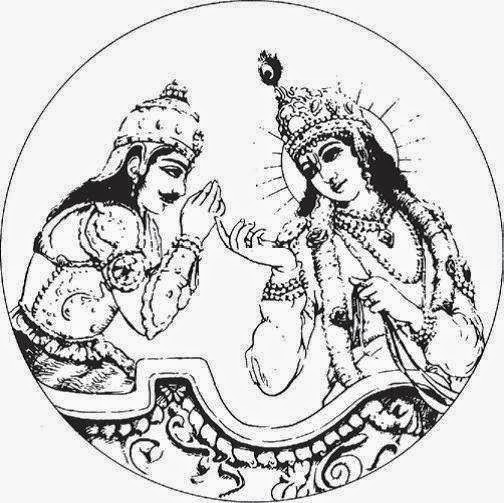Gita : Ch-4. Slo-32.
Srimad Bhagavad-Gita :
Chapter-4. ( Jnana-karma-sanyasa-yogam )
Slokam -32. ( All these different types of sacrifice are approved by the Vedas, and all of them are born of different types of work. Knowing them as such, you will become liberated.)
Evam bahuvidha yajna vitata brahmano mukhe,
karmajan viddhi tan sarvan evam jnatva vimokshyase.
evam bahu-vidha yajnah = this way many types of yajna-s;
brahmano mukhe vitatah = various ways to attain brahmam mentioned in detail in the Vedam;
tan sarvan = all of them;
karma-jan viddhi = born of karmam you should know;
evam jnatva = if knowing thus (this) and followed;
vimokshyase = you will be liberated from bondage of karmam.
Lord Krishna confirms the authenticity of the previous described yagnas or offerings of worship as being sanctioned by the Vedic scriptures by the word evam meaning of this kind and the different types have been explained in detail in the parampara or disciples succession and have been transmitted from spiritual master to disciple in the tradition of the Vedic culture. All of the before mentioned yagnas are performed by mind, by speech or by the physical body but their actions are of a transitory nature and the atma or soul is eternal. So these actions and the atma are not invariably connected. Thus comprehending this in reality one will be free from samsara the cycle of birth and death caused by actions.
The word brahmano is referring directly to the Supreme Lord Krishna the recipient of all yagnas or offerings of worship, through His attribute the Brahman or the spiritual substratum pervading all existence. Such yagnas according to the qualification of the performer may be mentally performed, orally performed or physically performed. Knowing this and performing ordained activities according to the injunctions of the Vedic scriptures one will attain moksa or liberation from the cycle of birth and death in the material existence. Performing yagna according to one's rank and station in life is what is being given here and whether it is mental, oral or physical the activity is still performed by concerted effort. So what is ordained by the injunctions of the Vedic scriptures should never be ignored or disregarded.
The words vitata brahmano mukhe means everything should be offered to the Supreme Lord. In the Brahman Vaivartaka Purana it states that: In all yagnas the Supreme Lord alone is to be propitiated. This means that every activity and all endeavours one undertakes should be in harmony with the injunctions and ordinances of the Vedic scriptures which are in complete and total harmony with the divine will of the Supreme Lord. No other alternative is tenable or acceptable for a human being.
Lord Krishna has described the 12 different performances of yagna or offerings of worship in propitiation to the Supreme Lord that are the means of attaining atma tattva or soul realisation performed in karma yoga or prescribed Vedic activities. It should be clearly understood that all yagnas manifest from activity of the mind, the speech or the body and involve the performance of regular daily duties and occasional special duties. Understanding this wisdom and practically applying this knowledge one shall by their own efforts dissolve all their sins and become free from samsara or bondage from the cycle of birth and death in the material existence. The wisdom aspect of karma has been explained by showing how jnana yoga or the cultivation of Vedic knowledge is involved in karma yoga. Next the importance of wisdom in jnana yoga will be elucidated.
Now Lord Krishna concludes His appraisal of yagnas or offerings of worship to propitiate the Supreme Lord in karma yoga or prescribed Vedic activities in order to adequately praise yagnas performed in jnana yoga or the cultivation of Vedic knowledge. Thus yagna is directly prescribed by the Vedic scriptures which are authorised by the Supreme Lord. Yet it should be understood that all yagnas are accomplished by activity whether it is of the mind, of speech or of the body. This activity material and not of the reality of the atma or soul which is purely spiritual. By comprehending this and devoting oneself to acquiring spiritual knowledge one will attain moksam or liberation from trans migratory existence.
To be continued ....





Comments
Post a Comment